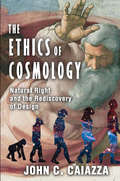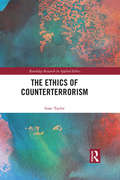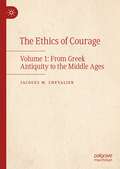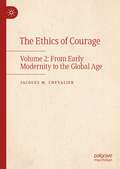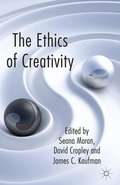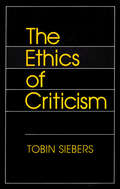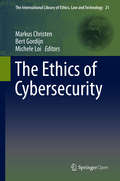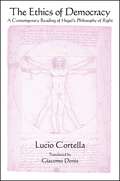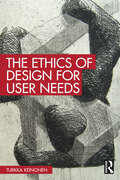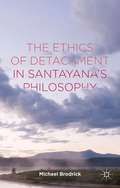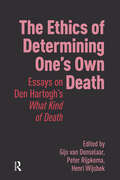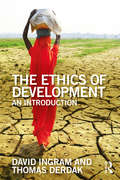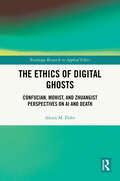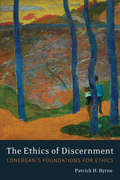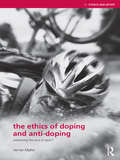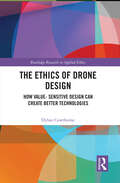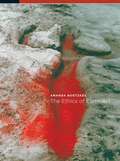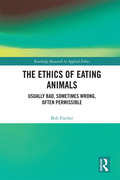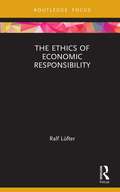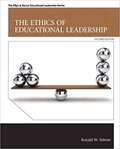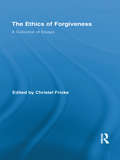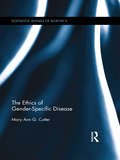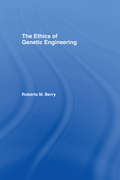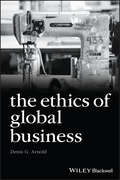- Table View
- List View
The Ethics of Cosmology: Natural Right and the Rediscovery of Design
by John C. CaiazzaWithin the last one hundred years, the scientific conception of the universe has undergone radical change. As a result a new field has evolved, called "cosmology," that examines the philosophical and scientific nature of the universe. Cosmology conceives of a material universe in which the interior of atoms do not act in the same predictable manner as the objects we can see and in which space is no longer empty volume unaffected by the matter within it. The universe is not a machine that operates with the same set of rules, but rather a living, growing organism.This new cosmology is forcing a consideration of the meaning of life that also calls for a reconsideration of moral law—the doctrine of natural right. Natural law theory is based on a cosmology that is grounded in classical metaphysics. John C. Caiazza uses the term "natural right" rather than "natural law" since his argument for cosmic teleology is based on the cosmology of contemporary science and not that of classical metaphysics. If evolution and development are the key to understanding nature, it is important to get the evolutionary concept of nature right, especially when it involves ethics.The universe can be viewed in two ways. One can admire the intricacy of the cosmological process on the physical, chemical, and astronomical levels. Or, one can look at this process as a result of design or providence. These two options should not preclude each other, Caiazza asserts; we should instead look closely at what science reveals about design. This volume offers an opportunity to reconcile the thinking of those who hold to traditional religious views on the origins of the universe and those who look to scientific explanations.
The Ethics of Counterterrorism (Routledge Research in Applied Ethics)
by Isaac TaylorStates across the globe spend billions of dollars fighting terrorism annually. As well as strategic questions about the way in which the money should be spent, we are also confronted with a host of moral issues here, many of which are poorly understood. The Ethics of Counterterrorism offers the first systematic normative theory for guiding, assessing, and criticising counterterrorist policy. Many commentators claim that state actors combating terrorism should set aside ordinary moral and legal frameworks, and instead bind themselves by a different (and, generally, more permissive) set of ethical rules than is appropriate in other areas. The book assesses arguments for this view, and more specifically investigates whether widely-endorsed restrictions on state action in the areas of surveillance, policing, armed conflict, criminal justice, diplomacy, and cultural integration need to be weakened when we are confronted with terrorist threats. With its novel overall framework for assessing counterterrorist strategies, its comprehensive analysis of existing practices, and its bringing the tools of analytic philosophy to bear on new questions regarding how states can fight terrorism both effectively and morally, The Ethics of Counterterrorism promises to be an important point of reference for future debates in this area.
The Ethics of Courage: Volume 1: From Greek Antiquity to the Middle Ages
by Jacques M. ChevalierThis two-volume work examines far-reaching debates on the concept of courage from Greek antiquity to the Christian and mediaeval periods, as well as the modern era. Volume 1 begins with Homeric poetry and the politics of fearless demi-gods thriving on war. The tales of lion-hearted Heracles, Achilles, and Ulysses, and their tragic fall at the hands of fate, eventually give way to classical views of courage based on competing theories of rational wisdom and truth. Fears of the enemy and anxieties about suffering and death are addressed through the lenses and teachings of medicine, geography, military history, moral philosophy, and metaphysics. For early Christian thinkers, the ethics of fear, fate, and fealty to the Almighty supplant the voice of reason and the wisdom of virtue. Much of Christian doctrine's history is a long journey towards bridging the gap between Greek philosophy and devotion to God and spirits in heaven. Some Church Fathers attempt to dispel the fear of suffering through a joyful craving for martyrdom and the eternal blessings that follow. Others show openness to one or more of the following principles: the abstractions of moral philosophy, the metaphysics of Gnostic enlightenment, the gift of free will and intentionality, the growth of church authority and hegemony, and the intrinsic worth of life on Earth. Augustine, Ambrose, Cassian, and Chrysostom play a central role in revisiting the foundations of Christian fortitude along some or all of these lines. They lay the groundwork for the scholastic adaptations of faith-based rationalism proposed by Peter Lombard, Philip the Chancellor, Albert the Great, and Thomas of Aquinas. The mediaeval period ends with church dissidents and Protestant Reform leaders condemning Rome’s corruption and calling for a return to early Christian faith and the courage of godly fear, submission, suffering, and fate.
The Ethics of Courage: Volume 2: From Early Modernity to the Global Age
by Jacques M. ChevalierThis two-volume work examines far-reaching debates on the concept of courage from Greek antiquity to the Christian and mediaeval periods, as well as the modern era. Volume 1 explains how competing accounts of epistêmê, rational wisdom, and truth dominated classical antiquity. Early Christian and mediaeval thinkers, in contrast, favoured fortitude founded on faith and fear of God over philosophical reasoning left to its own devices. Volume 2 turns to theories of courage from the early modern period to the present. It shows how the twin laws of polis and physis are at the heart of post-medieval thought. Courage is found at the crossroads of love and dread, freedom and fate, happiness and suffering, as well as power and submission to the ruling order. The later influence of evolutionism, existentialism, and the social and natural sciences on moral philosophy is also addressed at some length. The protection of people's best interests, the passions and powers of the human will, and the rule of active energy in all aspects of life supplant courage formerly viewed through the lens of reason or faith, or a combination of the two. These new ideas, paradoxically, herald the end of the ethics of courage. They also undermine the courage of ethical thinking. Courage is no longer an end in itself, nor is it a means to happiness "at the end." Regardless of what Gandhi, Tillich, and Foucault have to say about the topic, late modernity and the global age witness a marked loss of interest in courage as an idea worthy of conceptual investigation. Debates about the moral implications of courage give way to the value-free science of resilience, which studies how people can recover from past trauma and find wellness, primarily in the realm of physis.
The Ethics of Creativity
by James C. Kaufman Seana Moran David CropleyThe Ethics of Creativity illuminates the thorny issues that arise when novel creative ideas collide with what we believe to be 'right' or 'good'. This book tackles questions of when creativity and ethics tend to coincide and when conflict, and how both might be harnessed to support a brighter future for all.
The Ethics of Criticism
by Tobin SiebersTobin Siebers asserts that literary criticism is essentially a form of ethics. The Ethics of Criticism investigates the moral character of contemporary literary theory, assessing a wide range of theoretical approaches in terms of both the ethical presuppositions underlying the critical claims and the attitudes fostered by the approaches. Building on analyses of the moral legacies of Plato, Kant, Nietzsche, and Freud, Siebers identifies the various fronts on which the concerns of critical theory impinge on those of ethics.
The Ethics of Cybersecurity (The International Library of Ethics, Law and Technology #21)
by Markus Christen Bert Gordijn Michele LoiThis open access book provides the first comprehensive collection of papers that provide an integrative view on cybersecurity. It discusses theories, problems and solutions on the relevant ethical issues involved. This work is sorely needed in a world where cybersecurity has become indispensable to protect trust and confidence in the digital infrastructure whilst respecting fundamental values like equality, fairness, freedom, or privacy. The book has a strong practical focus as it includes case studies outlining ethical issues in cybersecurity and presenting guidelines and other measures to tackle those issues. It is thus not only relevant for academics but also for practitioners in cybersecurity such as providers of security software, governmental CERTs or Chief Security Officers in companies.
The Ethics of Democracy: A Contemporary Reading of Hegel's Philosophy of Right (SUNY series in Contemporary Italian Philosophy)
by Lucio CortellaThe legal regulations and formal rules of democracy alone are not enough to hold a society together and govern its processes. Yet the irreducible ethical pluralism that characterizes contemporary society seems to make it impossible to impose a single system of values as a source of social cohesion and identity reference. In this book, Lucio Cortella argues that Hegel's theory of ethical life can provide such a grounding and makes the case through an analysis of Hegel's central political work, the Philosophy of Right. Although Hegel did not support democratic political ends and wrote in a historical and cultural context far removed from the current liberal-democratic scene, Cortella maintains that the Hegelian theory of ethical life, with its emphasis on securing a framework conducive to human freedom, nevertheless offers a convincing response to the problem of the ethical uprootedness of contemporary democracy.
The Ethics of Design for User Needs
by Turkka KeinonenThis book offers an inquiry into the ethics of ‘human needs capture’ for design purposes by drawing upon ethical theories and narratives. Designers have historically relied upon the satisfaction of human needs as a moral justification for their profession. This volume offers an alternative critique to challenge this perspective, arguing that seeking to satisfy needs doesn't offer sufficient moral justification on its own. It presents an extensive ethical analysis of the notion of need and develops a thought-provoking case for a plural reconceptualisation of the notion of ‘need’ as user-based knowledge about product and service improvement opportunities. It does this by drawing upon a range of ethical approaches including Soran Reader’s needs ethics, classical utilitarianism, Robert Nozick’s libertarian philosophy, and John Rawls’ theory of justice. The book goes on to link these approaches to concepts guiding design such as human-centred design, collaborative design, and end user innovation. Written as a dialogue between a designer and his consciousness, the book underlines the deliberative nature of applied design ethics, and also highlights how consciousness challenges designers to solve their moral dilemmas. This engaging format invites readers to become an intimate part of the ‘discussion’. This book will be of interest to students and academics studying product design, industrial design, interaction design, user experience design, design ethics, and sustainable development.
The Ethics of Detachment in Santayana’s Philosophy
by Michael BrodrickGerman philosopher Arthur Schopenhauer wrote in 1818 that true happiness is impossible without inner peace. Around a hundred years later, after studying Schopenhauer, American philosopher George Santayana explained in detail how we can achieve inner peace through a special activity he called 'spirituality'. While Santayana's theory of spirituality is not well known today, it holds great promise for improving our lives. A form of momentary detachment from ideals and values, spirituality frees us to enjoy what there is, without judging it. Brodrick clarifies and completes Santayana's account of spirituality, while suggesting how spirituality can relieve human suffering, enrich our daily lives, and even make us better human beings. The finitude of the world and our own finitude mean that nothing in this life will ever be perfect, but spirituality reveals that, in a sense, everything is good enough as it is.
The Ethics of Determining One’s Own Death: Essays on Den Hartogh’s What Kind of Death
by Gijs Van Donselaar Peter Rijpkema Henri WijsbekThis collection brings together key contributions on the ethics of end-of-life decisions, inspired by the publication of What Kind of Death: The Ethics of Determining One’s Own Death, a new standard work by professor Govert den Hartogh. The topics covered reflect the book's comprehensive approach, with its central themes explored by ethicists, legal experts, and medical professionals. The various contributions offer a thorough examination of the major steps in Den Hartogh’s 'dual track approach'. This collection serves as a valuable supplement to the book and an important contribution to the ongoing debate about patient self-determination and well-being as foundational values in the ethics of determining one’s own death.
The Ethics of Development: An Introduction (The Ethics of ...)
by David Ingram Thomas J DerdakThe Ethics of Development: An Introduction systematically and comprehensively examines the ethical issues surrounding the concept of development. The book addresses important questions such as: What does development mean? Is there a human right to development? If we aim for sustainable development in an age of global climate change, should developed nations sacrifice economic growth for the sake of allowing developing countries to catch up? Should eradication of poverty or diminution of radical inequality be the principal focus of developmental policy? What are the macroeconomic theories of development? And how have they informed development policy? How does development work in practice? Featuring case studies throughout, this textbook provides a philosophical introduction to an incredibly topical issue studied by students within the fields of applied ethics, global justice, economics, politics, sociology, and public policy.
The Ethics of Digital Ghosts: Confucian, Mohist, and Zhuangist Perspectives on AI and Death (Routledge Research in Applied Ethics)
by Alexis M. ElderAdvances in artificial intelligence (AI) are enabling the construction of “digital ghosts”: algorithmic reconstructions of deceased individuals based on patterns of interaction in their text messages, social media posts, and other personal data. This book develops an ethics of digital ghosts using resources from classical Chinese philosophy.Bereaved people have reported that conversations with digital ghosts can be surprisingly comforting and beneficial. However, there are concerns that they can be harmful, whether by preventing a hard but necessary acknowledgment of loss, producing ongoing dependence, or encouraging instrumentalization of our beloved dead. Building on some suggestive comparisons between digital remains and physical remains, this book uses resources from classical Chinese philosophy to connect concerns from funerary ethics to those presented by AI today. Confucianism, Mohism, and Zhuangism were remarkable for their rich, detailed discussions of the ethics of handling physical remains. This book updates and extends these concerns to apply to digital ghosts. It explores topics including the role of rituals and traditions in communal mourning, the epistemic consequences of fragmented standards for remembrance and data reuse, and the value of creative transformation and adaptation. The result is a psychologically plausible, culturally informed, and afterlife-neutral grounding for thinking about the ethics of digital ghosts.The Ethics of Digital Ghosts will appeal to researchers and graduate students working in applied ethics, moral psychology, philosophy of technology, technology and AI ethics, cross-cultural philosophy, and classical Chinese philosophy.
The Ethics of Discernment
by Patrick H. ByrneIn The Ethics of Discernment, Patrick H. Byrne presents an approach to ethics that builds upon the cognitional theory and the philosophical method of self-appropriation that Bernard Lonergan introduced in his book Insight, as well as upon Lonergan's later writing on ethics and values.Extending Lonergan's method into the realm of ethics, Byrne argues that we can use self-appropriation to come to objective judgements of value. The Ethics of Discernment is an introspective analysis of that process, in which sustained ethical inquiry and attentiveness to feelings as "intentions of value" leads to a rich conception of the good.Written both for those with an interest in Lonergan's philosophy and for those interested in theories of ethics who have only a limited knowledge of Lonergan's work, Byrne's book is the first detailed exposition of an ethical theory based on Lonergan's philosophical method.
The Ethics of Doping and Anti-Doping: Redeeming the Soul of Sport? (Ethics and Sport)
by Verner MøllerWith every positive drugs test the credibility and veracity of modern elite sport is diminished. In this radical and provocative critique of current anti-doping policy and practice, Verner Møller argues that the fight against doping – promoted as an initiative to cleanse sport of cheats – is at heart nothing less than a battle to save sport from itself, located on the fault-line between the will to purity and the will to win. Drawing on extensive and detailed case studies of doping in sport, and using a highly original blend of conceptual ideas from philosophy and sociology, Møller strongly criticises current anti-doping regimes and challenges our commonly held ideas about the nature of sport and the risks posed by drugs to health and fair play. He argues forcefully that we must understand the precarious position of the athlete and that only by containing coaches, doctors and drug companies within the anti-doping regime can we hope to ever make progress on this most important issue. Written in a lively and engaging style, and skilfully blending empirical case studies with cutting edge theory, this book represents an important statement on the nature of sport, morality and modernity. It is important reading for all serious students and scholars of the ethics, sociology and politics of sport.
The Ethics of Drone Design: How Value-Sensitive Design Can Create Better Technologies (Routledge Research in Applied Ethics)
by Dylan CawthorneThis book presents a holistic approach to the design and use of drones. It argues that this powerful technology requires high levels of ethical analysis and responsibility – our moral progress must keep pace with our technological progress. Drone technologies support and diminish the flourishing of certain human values, impact power relations between individuals and groups, and add an additional element to the complex network of humans and objects in modern society. The book begins by introducing four prototype drones designed and built by the author: the healthcare drone, the search and rescue drone, the educational drone, and the spiritual drone. These drones have been developed using a value-sensitive design approach – with values such as human welfare, privacy, trust, environmental sustainability, and justice at the forefront. Ethical analyses and social impacts are taken as design inputs, leading to the creation of better, more responsible drone designs. The book then showcases additional methods used to develop the prototype drones from the fields of engineering, ethics, and art, including ethical frameworks, ethics standards, capability caution, and speculative design. The holistic approach reveals a more subtle and nuanced view of drones than the currently polarized characterization of "the good drone" or "the killer drone". The book concludes with recommendations for drone engineers, companies, lawmakers, and citizens on how to support ethics in drone design. The Ethics of Drone Design is an essential resource for scholars, advanced students, engineers, and designers interested in the ethics of technology.
The Ethics of Drone Design: How Value-Sensitive Design Can Create Better Technologies (Routledge Research in Applied Ethics)
by Dylan CawthorneThis book presents a holistic approach to the design and use of drones. It argues that this powerful technology requires high levels of ethical analysis and responsibility – our moral progress must keep pace with our technological progress. Drone technologies support and diminish the flourishing of certain human values, impact power relations between individuals and groups, and add an additional element to the complex network of humans and objects in modern society. The book begins by introducing four prototype drones designed and built by the author: the healthcare drone, the search and rescue drone, the educational drone, and the spiritual drone. These drones have been developed using a value-sensitive design approach – with values such as human welfare, privacy, trust, environmental sustainability, and justice at the forefront. Ethical analyses and social impacts are taken as design inputs, leading to the creation of better, more responsible drone designs. The book then showcases additional methods used to develop the prototype drones from the fields of engineering, ethics, and art, including ethical frameworks, ethics standards, capability caution, and speculative design. The holistic approach reveals a more subtle and nuanced view of drones than the currently polarized characterization of "the good drone" or "the killer drone". The book concludes with recommendations for drone engineers, companies, lawmakers, and citizens on how to support ethics in drone design. The Ethics of Drone Design is an essential resource for scholars, advanced students, engineers, and designers interested in the ethics of technology.
The Ethics of Earth Art
by Amanda BoetzkesSince its inception in the 1960s, the earth art movement has sought to make visible the elusive presence of nature. Though most often associated with monumental land-based sculptures, earth art encompasses a wide range of media, from sculpture, body art performances, and installations to photographic interventions, public protest art, and community projects. In The Ethics of Earth Art, Amanda Boetzkes analyzes the development of the earth art movement, arguing that such diverse artists as Robert Smithson, Ana Mendieta, James Turrell, Jackie Brookner, Olafur Eliasson, Basia Irland, and Ichi Ikeda are connected through their elucidation of the earth as a domain of ethical concern. Boetzkes contends that in basing their works&’ relationship to the natural world on receptivity rather than representation, earth artists take an ethical stance that counters both the instrumental view that seeks to master nature and the Romantic view that posits a return to a mythical state of unencumbered continuity with nature. By incorporating receptive surfaces into their work—film footage of glaring sunlight, an aperture in a chamber that opens to the sky, or a porous armature on which vegetation grows—earth artists articulate the dilemma of representation that nature presents. Revealing the fundamental difference between the human world and the earth, Boetzkes shows that earth art mediates the sensations of nature while allowing nature itself to remain irreducible to human signification.
The Ethics of Eating Animals: Usually Bad, Sometimes Wrong, Often Permissible (Routledge Research in Applied Ethics)
by Bob FischerIntensive animal agriculture wrongs many, many animals. Philosophers have argued, on this basis, that most people in wealthy Western contexts are morally obligated to avoid animal products. This book explains why the author thinks that’s mistaken. He reaches this negative conclusion by contending that the major arguments for veganism fail: they don’t establish the right sort of connection between producing and eating animal-based foods. Moreover, if they didn’t have this problem, then they would have other ones: we wouldn’t be obliged to abstain from all animal products, but to eat strange things instead—e.g., roadkill, insects, and things left in dumpsters. On his view, although we have a collective obligation not to farm animals, there is no specific diet that most individuals ought to have. Nevertheless, he does think that some people are obligated to be vegans, but that’s because they’ve joined a movement, or formed a practical identity, that requires that sacrifice. This book argues that there are good reasons to make such a move, albeit not ones strong enough to show that everyone must do likewise.
The Ethics of Economic Responsibility (Economics and Humanities)
by Ralf LüfterThe Ethics of Economic Responsibility raises fundamental ethical questions related to the conceptualization of economic responsibility, that is: the imperative to fulfil certain economic obligations. It builds on a basic characterization of the question of ethics in order to introduce responsibility as a constitutive element for a new determination of economic knowledge. Drawing on the metaphysical tradition of philosophy, the book explores the distinction between "operability-based-responsibility" and "end-in-itself-based responsibility" and also considers what is tentatively called "being-related responsibility". By presenting these arguments about the notion of economic responsibility, the book contributes to the growing calls for ethical questions to not be merely complementary to the ongoing discourse of economic sciences, but rather to sit at its core, in such a way as to restore the intrinsic ethical dimension of economics itself. The book marks a significant contribution to the literature on the philosophy of economics, applied ethics more broadly, and the critical discourse concerning mainstream economics.
The Ethics of Educational Leadership
by Ronald ReboreIn The Ethics of Educational Leadership, the author of one of the leading texts in human resource administration presents a practical resource dealing with significant ethical issues involved in building and central office administration. In it, Ronald Rebore presents the ethical ideas and notions of 20 philosophers and psychologists applied to the practice of educational leadership. <p><p> The book helps tomorrow’s educational leaders evaluate the philosophical ideas of others, and use what they discover to develop their own way of approaching their leadership responsibilities.
The Ethics of Forgiveness: A Collection of Essays (Routledge Studies in Ethics and Moral Theory)
by Christel FrickeWe are often pressed to forgive or in need of forgiveness: Wrongdoing is common. Even after a perpetrator has been taken to court and punished, forgiveness still has a role to play. How should a victim and a perpetrator relate to each other outside the courtroom, and how should others relate to them? Communicating about forgiveness is particularly urgent in cases of civil war and crimes against humanity inside a community where, if there were no forgiveness, the community would fall apart. Forgiveness is governed by social and, in particular, by moral norms. Do those who ask to be forgiven have to fulfil certain conditions for being granted forgiveness? And what does the granting of forgiveness consist in? We may feel like refusing to forgive those perpetrators who have committed the most horrendous crimes. But is such a refusal justified even if they repent their crimes? Could there be a duty for the victim to forgive? Can forgiveness be granted by a third party? Under which conditions may we forgive ourselves? The papers collected in the present volume address all these questions, exploring the practice of forgiveness and its normative constraints. Topics include the ancient Chinese and the Christian traditions of forgiveness, the impact of forgiveness on the moral dignity and self-respect of the victim, self-forgiveness, the narrative of forgiveness as well as the limits of forgiveness. Such limits may arise from the personal, historical, or political conditions of wrongdoing or from the emotional constraints of the victims.
The Ethics of Gender-Specific Disease (Routledge Annals of Bioethics)
by Mary Ann CutterOur understanding of gender carries significant bioethical implications. An errant account of gender-specific disease can lead to overgeneralizations, undergeneralizations, and misdiagnoses. It can also lead to problems in the structure of health-care delivery, the creation of policy, and the development of clinical curricula. In this volume, Cutter argues that gender-specific disease and related bioethical discourses are philosophically integrative. Gender-specific disease is integrative because the descriptive roles of gender, disease, and their relation are inextricably tied to their prescriptive roles within frames of reference. An integrative account of gender-specific disease carries ethical implications because our understanding of gender-specific disease is evaluative, and our evaluations of gender-specific disease entail judgments concerning the praiseworthiness and blameworthiness of a clinical event. Cutter supports a "both/and" emphasis on context and integration in relation to gender-specific disease and bioethical analyses. While the text mainly focuses on gender-specific diseases that affect women, Cutter also includes examples involving men, children, and members of the LGBT community.
The Ethics of Genetic Engineering (Routledge Annals of Bioethics #Vol. 4)
by Roberta M. BerryHuman genetic engineering may soon be possible. The gathering debate about this prospect already threatens to become mired in irresolvable disagreement. After surveying the scientific and technological developments that have brought us to this pass, The Ethics of Genetic Engineering focuses on the ethical and policy debate, noting the deep divide that separates proponents and opponents. The book locates the source of this divide in differing framing assumptions: reductionist pluralist on one side, holist communitarian on the other. The book argues that we must bridge this divide, drawing on the resources from both encampments, if we are to understand and cope with the distinctive problems posed by genetic engineering. These problems, termed "fractious problems," are novel, complex, ethically fraught, unavoidably of public concern, and unavoidably divisive. Berry examines three prominent ethical and political theories – utilitarianism, Kantianism, and virtue ethics – to consider their competency in bridging the divide and addressing these fractious problems. The book concludes that virtue ethics can best guide parental decision making and that a new policymaking approach sketched here, a "navigational approach," can best guide policymaking. These approaches enable us to gain a rich understanding of the problems posed and to craft resolutions adequate to their challenges.
The Ethics of Global Business (Foundations of Business Ethics)
by Denis G. ArnoldProvides an original account of international business ethics grounded in cosmopolitan human rights theory Transnational companies (TNCs) operate in a variety of political jurisdictions and legal frameworks. As international trade and foreign direct investment (FDI) continue to increase, TNCs based in industrialized 'home' nations are gaining enormous economic and political influence in developing 'host' nations. Corporations operating internationally, particularly in nations with limited regulatory and enforcement resources, are often free to determine whether they will follow existing laws and guidelines regarding consumer protection, worker safety, and environmental protection. The Ethics of Global Business provides clear and pragmatic guidance for business leaders interested in the ethical conduct of international business. With a cosmopolitan human rights perspective on international business ethics, this comprehensive volume describes modern transnational companies, explains why companies and their leaders are responsible for company policies and practices, and presents a conceptual framework grounded in respect for basic human rights. Arnold addresses a wide range of central topics, such as the role of transnational companies in global justice, the human rights obligations of transnational companies, labor rights in global supply chains, corporate responsibility regarding global climate change, and exploitation and empowerment at the base of the global economic pyramid. Presents and defends a theory of moral legitimacy that views TNCs as agents of justice Offers an alternative ethical conception of CSR that integrates a cosmopolitan human rights perspective Provides critical and ethical analysis of recent United Nations (UN) initiatives on business and human rights including the UN tripartite framework recently approved by the UN Human Rights Council Analyzes current Base of the Pyramid (BoP) strategies Defends minimum standards for working conditions in global supply chains and analyzes wage exploitation in developing nations Demonstrates the need for ethical CSR and morally legitimate BoP business ventures that do not exploit people living in moderate and extreme poverty (MEP)The Ethics of Global Business is essential reading for business leaders, policymakers, scholars, undergraduate and graduate students, and general readers with an interest in business ethics, global justice, human rights, sweatshop ethics, solutions to global poverty, corporate environmental sustainability, and global climate change as related to transnational companies.
